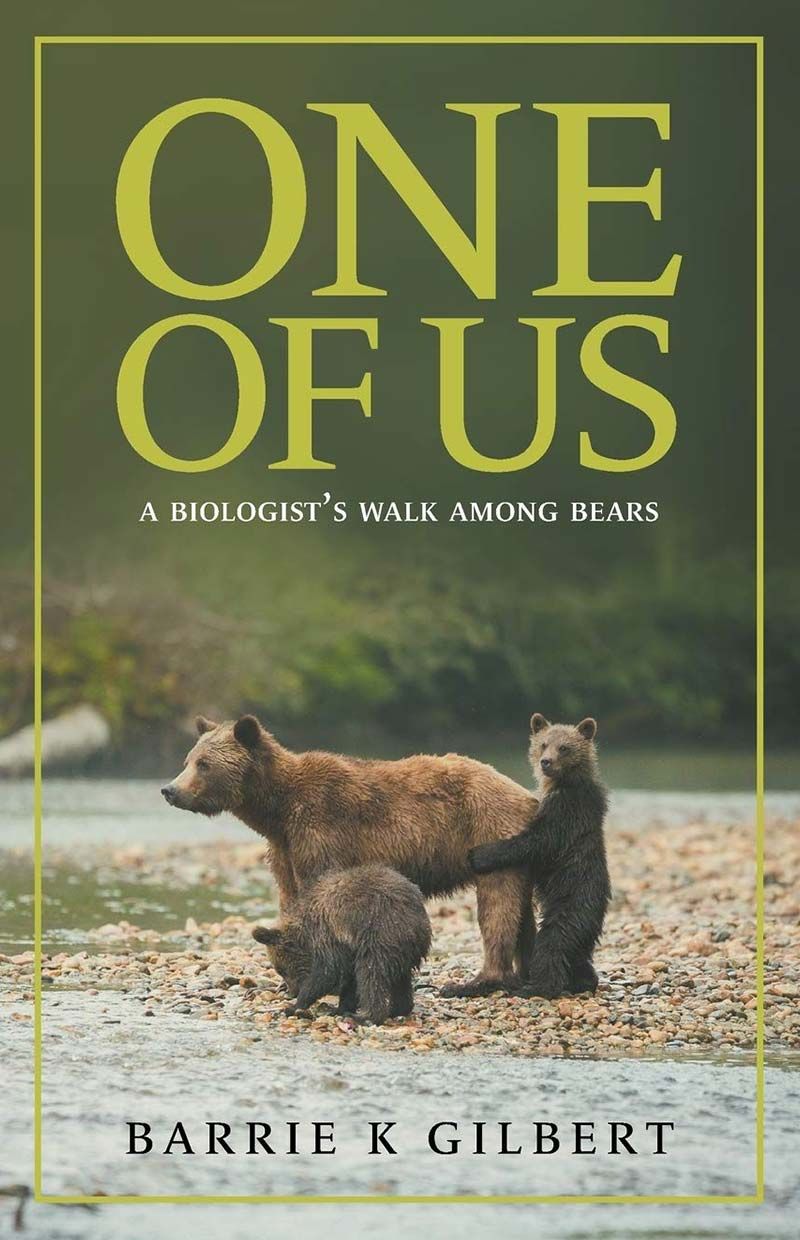Reviewed by Jeff Green | Jan 22, 2020
At the beginning of his book, One of US – A biologist’s walk among bears, Barrie Gilbert answers the question that people who have met him invariably wonder about.
How did this world-renowned bear expert lose his left eye, and much of the left side of his face? The answer is not surprising. It was a grizzly bear encounter in Yellowstone Park.
What is surprising is that the incident took place pretty early in his career as a bear biologist in 1977, and that it did not end his career, but almost seemed to spur it on.
The physician’s report about the injuries is reprinted in the book, “the injuries included multiple lacerations across the back of the scalp forward to the face. The left side of the face was destroyed, left eye missing, entire lateral aspect left mouth open, all salivary glands of left face destroyed, the left superior nasal and inferior orbit open … estimated blood loss was 2/5 of his total volume.”
As harrowing as that account is, it does not compare to the visceral impact of Gilbert’s account in the book of the incident itself.
After the swift, brutal attack, his graduate student chased the bear off, then called the park’ emergency services, and somehow they were able to get him off the mountain and to a clinic nearby. Fortunately, doctors on call at the clinic had served in the Vietnam war and were more accustomed to severe trauma.
“Have you ever seen this kind of damage” he asked one of the plastic surgeons back in Utah, where was flown to for further treatment. “Yes, but not on the same guy,” was the answer.
Later, when Gilbert was asked to give talks on bear safety, he thought it was like asking the captain of the Exxon Valdez to give a lecture on seamanship.
Even on the day of his own near fatal encounter with a female grizzly, which he described as the “furious behaviour of a mother protecting her cubs” he insisted that the bear he “had surprised” not be destroyed because he knew that the encounter was “triggered by my sudden appearance and felt that the grizzly should not be the victim of our accidental contact.”
Over forty years removed from that day, from his home on Wolfe Island, Gilbert decided to write a book for the general public that contains the insights from decades studying bears in the field.
“One of Us” describes dozens of bear encounters and observations in different settings, none as dramatic as the first, but all clearly described. The book challenges many of the common perceptions about grizzlies that trace back to the Lewis and Clark expedition. Gilbert looked at all of the written accounts from the Lewis and Clark expedition, which recorded 51 grizzly kills and 18 other wounded bears, and no human fatalities. The vast majority of the instances that are described are cases where expedition members were the aggressors.
The bulk of the book contains detailed observations of the cultural reality that exists among bear populations in different locations. He describes how bears need to understand their habitat in order to maximise their foraging success, and how interactions with humans alter in different circumstances. In many cases, bears are less concerned about humans than about other bears. This is because humans represent less of a threat, unless those humans happen to be hunters.
In salmon rich locations in Alaska, bears are often unconcerned about either humans or other bears; it gets in the way of maximising the feeding potential offered by a salmon run. The book deals head-on with the myth that grizzlies are beasts that kill for pleasure. Instead, it offers evidence of how bear behaviour can be explained by the social world that they inhabit and learn from. Factors such as the availability of food, and proximity to other bears and humans, have an impact on bear behaviour.
The book provides much evidence for its ultimate thesis that the only way to preserve grizzly and other bear species in the wild is to preserve habitat. It is imperative to ensure that the wilderness park system, in the United States and in Canada as well, maintains a focus on preservation of wild spaces instead of expanding human recreation opportunities.
Gilbert’s conclusions about bear safety are also instructive. When travelling in grizzly country, it is important to pay attention.
“I can stay much more aware on trails if I make a conscious mental shift by suppressing any tendency to reminisce or fantasize and become instead a primitive sensory animal, constantly scanning everything ahead, listening intently, and sniffing for wet bear or the odor of dead meat.”
For further information or to order the book, go to barriegilbert.ca
More Stories
- Harrowsmith Public School and the Magic of Theatre
- You’re a Good Man Charlie Brown – a school wide effort at SHS
- Leadership From Within
- New Bulk Water Station in Sydenham
- Frontenac County Council looks at Healthcare Recruitment
- Good Turn Out Maple Fest Despite Rain
- Future looking brighter for Denbigh Fire Department says Chief
- Local Favourites featured at 2nd Annual SF Music Festival
- Perth Festival of the Maples, Saturday, April 27
- South Frontenac Council

